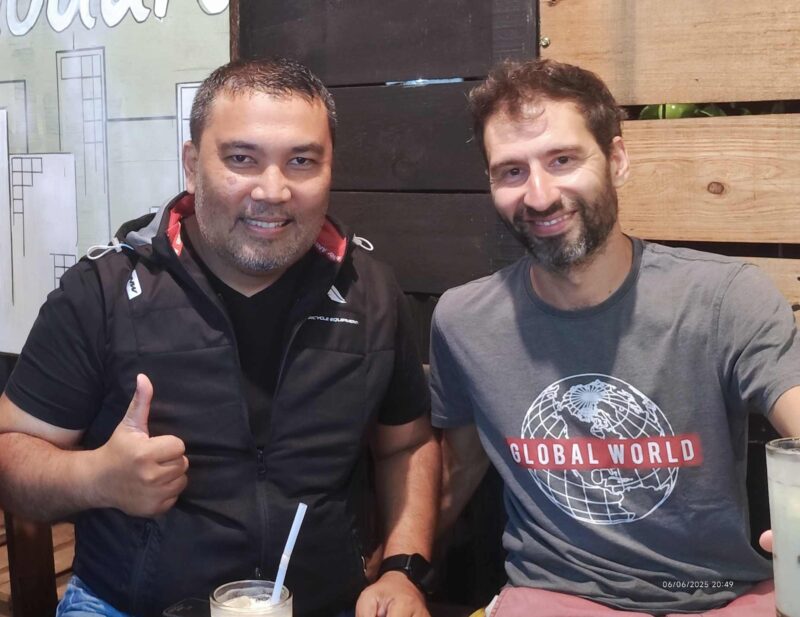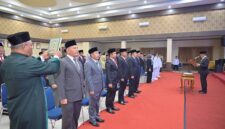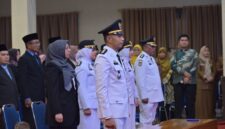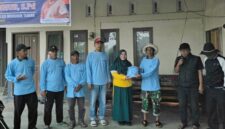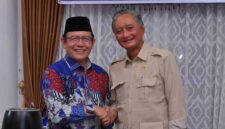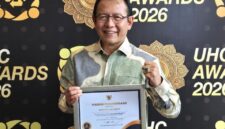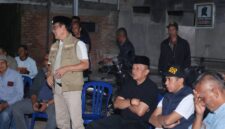Payakumbuh | tipikal.com – I am Daniele Alfarone, I spent a week traveling through the Harau Valley, a stunning canyon nestled in the heart of Sumatra. (For those who read my previous article: this valley is the reason I took that tragicomic road trip to Bukittinggi.)
While chatting with locals, I learned something surprising: the Minangkabau people follow a matrilineal lineage. “Wait—aren’t they Muslim!?” I asked, genuinely confused. The answer was yes. That apparent contradiction intrigued me, so I decided to dig deeper.
The Minangkabau people primarily live in the highland region of West Sumatra, centered around Bukittinggi and the surrounding Minangkabau Plateau. During my time there, I interviewed four people—all identifying as Minangkabau: two men and two women.
Robby Muchsis (50): The Suku Chief
Robby is a married man and the chief of his suku. In Minangkabau culture, a suku is a kinship group traced through the maternal line. Members share a common ancestral mother.
When I asked how this system aligns with Islam, Robby responded: “The Prophet said you must honor your mother first, then your mother again, then your mother once more—only then your father.” In his view, Minangkabau people are simply following the Quran.
I challenged him gently—many other Muslim cultures also follow the Quran but are not matriarchal. He acknowledged the point, and our conversation deepened.
Islam began spreading in Sumatra as early as the 13th century, brought by traders and scholars from the Middle East and India. But Robby explained that the matrilineal tradition long predates Islam, likely rooted in Animist belief systems that existed well before recorded history.
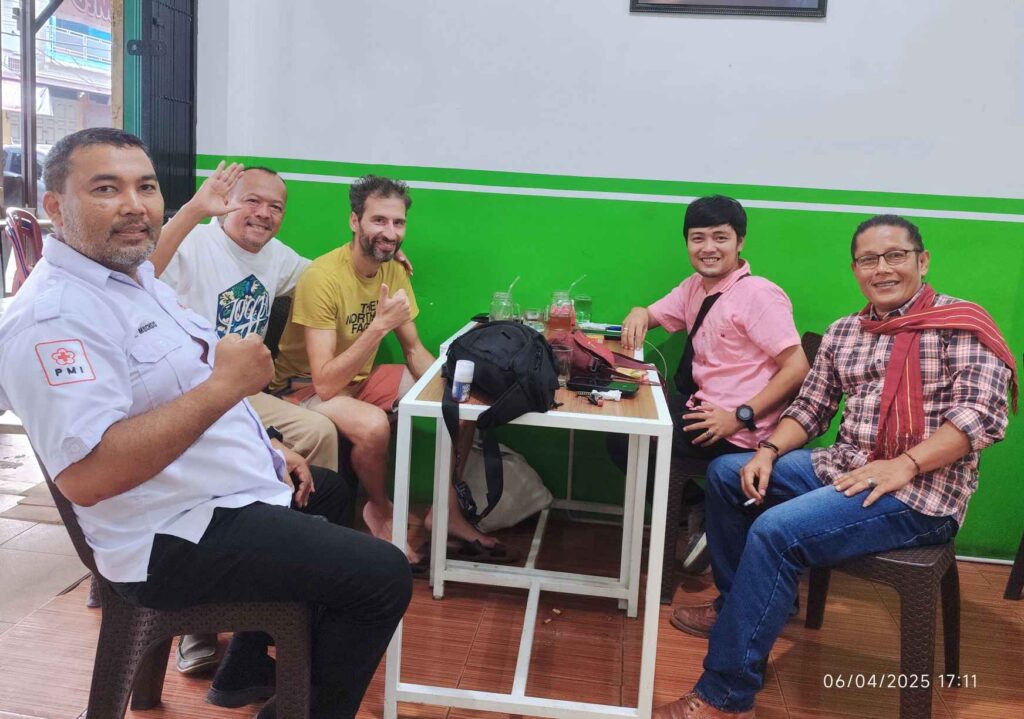
In practice, he said, people here don’t think much about Animism—or even about the region’s earlier Hindu or Buddhist faiths. They consider themselves 100% Muslim. The older customs are seen as adat—local traditions passed down through generations. In Robby’s view, adat and Islam form a “harmonious blend.”
The Inheritance Question
Our conversation moved to inheritance, where tensions between Islam and matrilineal traditions become most visible.
“As the suku chief,” Robby said, “I manage properties passed down from our great-grandparents—land, a farm, and a house. After me, it won’t go to my son—it will go to my sister’s son.”
“Why is that?” I asked.
“It follows the matrilineal line—so, my sister. But the chief must be male, so her son.”
That seemed contradictory. “Wait, but if there’s a divorce, isn’t the woman penalized? The house belongs to the man, no?”
“No, no,” he replied. “You need to understand that there are two kinds of property: suku property and personal property. The suku property belongs to the kin group, not to me personally. I can’t sell it—I’m just managing it for future generations. That’s adat.”
“And personal property?” I asked.
“That’s just regular ownership. If I buy a house with my own money, I can sell it or do whatever I want. That follows Islamic law.”
Rahmat (56): A Journalist Between Two Worlds
Rahmat, a journalist and the one who introduced me to Robby, mostly stayed quiet during our coffee meeting. Later, he opened up to me.
His mother is Minangkabau and Muslim; his father is Batak, a Protestant and from a patriarchal culture. When his father married his mother, he had to convert to Islam—required by Indonesian law.
Rahmat feels there is significant conflict between Islamic beliefs and the Minangkabau matrilineal structure. He noted that West Sumatra has one of the highest divorce rates in Indonesia, and in most cases, the women initiate the divorce.
In his view, the matrilineal system gives women security and incentive. After divorce, they typically remain in their own suku home with their children. “The man is only a guest,” he said. “Even if he builds the house, he doesn’t own it. Some men end up homeless. Many intellectuals from here hate this system. That’s why they leave.”
I challenged him—his view seemed a bit one-sided. But when asked what kind of society he idealized, he answered without hesitation: “A patriarchy!”
Devi (54): Keeper of the Homestay
Devi is a married woman who runs a cozy homestay with her husband. Together, they also raise cats, ducks, birds, and plants. The birds are trained for singing competitions.
She’s a proud Minangkabau woman. Like Robby, she believes that adat and Islam are fully compatible: “We are matrilineal, but that doesn’t mean we do things that go against Islam. We must obey our husbands, as Islam says. We must care for the family, as Islam teaches.”
When I asked her about property, she explained: “In the past, Minangkabau men had to travel for work. The women stayed home and managed everything. That’s why property is passed through the mother. Women manage the family’s money, but decisions are made together with the husband.”
Devi worries that young people are straying from Minangkabau values. “They don’t follow adat because they don’t follow Islam. Weak Islamic foundation means weak tradition. Parents must guide them back to Islam—then the culture will follow.”
Diwi (59): A Divorced Woman and Caretaker
I met Diwi while looking for a jungle trek guide. She invited me and a friend to her beautiful villa outside town. Divorced and self-reliant, she tends the house and garden on her own.
She, too, is proud of her Minangkabau heritage—but sees its limits.
“I like that inheritance goes to daughters,” she said, “but it also comes with responsibility. I have to take care of my brothers and uncles if they fall on hard times. That worries me.”
Most of her inheritance is agricultural land, but farming requires money, time, and physical labor—difficult tasks for a divorced woman. Worse still, suku land cannot be sold, only used. It remains collective property, not truly hers.
After her divorce, her ex-husband provided little support for their children’s education. “The matriarchal system sounds great on paper, but it doesn’t provide practical support for women after a divorce. You feel disillusioned.”
As for the younger generation, she echoed Devi’s concerns: “They attend the rituals, but don’t understand them. Modernization is changing everything.”
Reflections: A Tangled Web of Faith, Culture, and Gender
Some facts provide context:
Divorce rates: West Sumatra has the second-highest divorce rate in Indonesia.
Women in Islam: The Quran emphasizes equal respect to both parents, but Hadith traditions give precedence to the mother. It also instructs modesty for women (Q.24:31 and Q.33:59).
Migration: The Minangkabau are known for their diaspora, encouraged by cultural norms around seeking education and trade—not necessarily to escape matriarchy.
Post-divorce law: Legally, Indonesian fathers must support their children. But under adat, children stay with the mother’s suku, and the father has no traditional obligation. In practice, many mothers rely on their extended family for support.
As I explored deeper, I found myself knee-deep in a topic both complex and sensitive. Historical, religious, cultural, and personal forces are tightly intertwined. Everyone I spoke to had their own perspective—shaped by age, gender, personal experience, and identity.
I also had to recognize my own biases. I’m a Westerner, raised in a patriarchal society that has made major strides toward gender equality over the past few decades. To me, it was striking how both adat and religion seemed open to interpretation—often shaped to fit personal or communal identity.
It also struck me how many people chose to explain matrilineal customs as “just adat,” rather than acknowledging their deeper roots in pre-Islamic Animist systems. Framing them this way makes it easier to reconcile with a Muslim identity. Yet, even as adat is called “matriarchal,” traces of patriarchy linger—like the requirement that a suku chief must be a man.
A Final Thought
I could easily get lost in academic research on this subject. But then I remind myself: I’m not an anthropologist, a sociologist, or a historian. I’m just a curious traveler.
So, at the risk of sounding naïve, I leave with one simple question:
What would it take to build a society that is neither matriarchal nor patriarchal?
One where inheritance is based on personal choice—on a will, not on gender or lineage?
One where culture and faith empower, rather than constrain?
Perhaps that journey—just like my road to Harau—is full of bumps, wrong turns, and surprising views.
This article has been redacted by tipikal.com. You can find the original source here:
https://danielealfarone.substack.com/p/minangkabau-the-interesting-case

